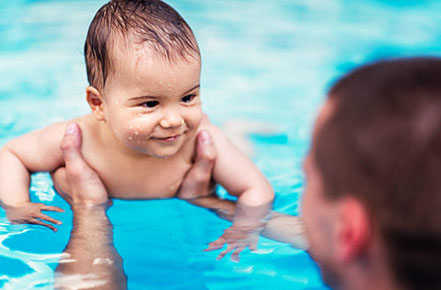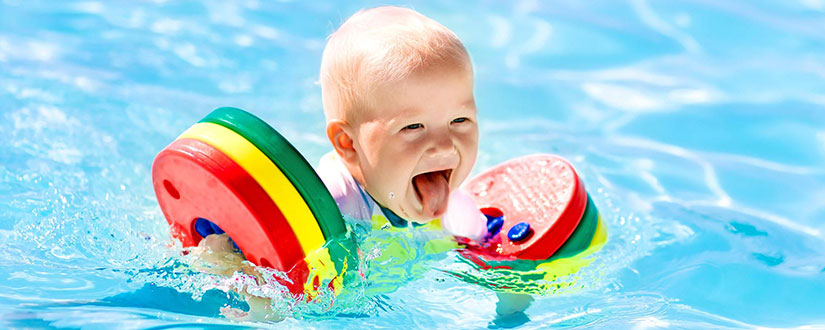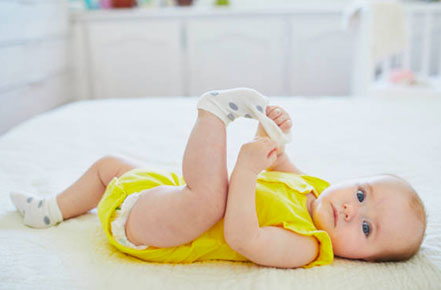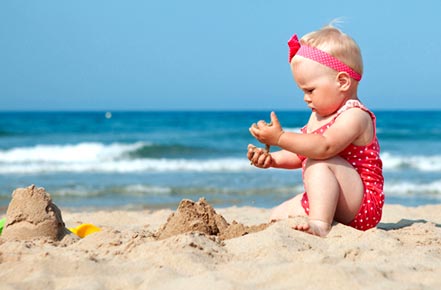Everybody loves their newborn child so much that they want to share their experiences with them. Parent and newborn swimming sessions are one of the most bonding experiences for a family, so here you’ll learn when can baby swim, and everything to know about newborn swimming.
In general, you should hold off taking your child inside the swimming pool until they have reached about six months. The younger the baby, the less neck strength they have to keep their head up high, and so they could struggle to regulate the temperature within their body. The problem is more significant outdoors because, before six months, sunscreen is generally not recommended for toddlers and very young children.
By the age of six months, your child should have had enough pass to be introduced to a newborn swimming pool. They should be able to enjoy the experience of swimming in a pool at the age of half a year. To be sure, consulting your pediatrician is the best advice if you’re wondering “when can I take my baby swimming. Every child is different, so the answer is not always as simple as you think.
When to Start Swimming Lessons
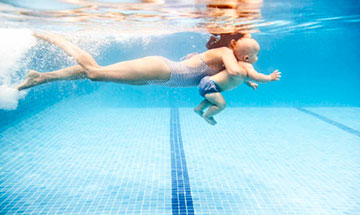
Swimming lessons aren’t entirely of benefit for a baby, younger than a year. It is highly unlikely that a child below one-year-old will be able to learn swimming techniques or even understand what is going on in a lesson. If you’re itching for your child to learn, be patient for a little while and refrain from signing them up to any lessons until they reached at least a year. As a reminder, no swim instruction serves as a substitute for professional and adult supervision.
If the child really dislikes water, don’t rush them into lessons immediately as they turn a year old, instead wait until they become more comfortable with it. As we stated previously, every child is unique, and some children won’t be ready for swimming until at least the age of four or above. Don’t worry if your little one is not having as much fun in a pool as you may expect them to.
When to Take Baby for Their First Ever Swim
If you’re questioning when can babies go swimming, it may surprise you that it’s possible for a baby to swim right after you’ve given birth. The National Health Service in the UK has stated that a baby can be taken swimming at any age, no need to wait until your newborn has had its immunizations and shots. However, you’re not going to take a two-week toddler to baby swimming lessons just yet. Although swimming is safe at any age, mothers should wait around a week to join their children in the pool because there could be complications with post-birth vaginal bleeding. It is better for the mother to avoid infection, to wait until bleeding stops and also to wear the best tampons for swimming for a good two weeks after it’s stopped. However, if the father is willing, then they can certainly bond with their newborn by taking them to the pool at any time.

Let’s dispel a common myth – children are not able to swim as soon as they are born. While a lot of people may not think it’s true, it is indeed a fact that children can swim right after birth. Baby swimming pool age = 0! You’re not going to expect them to paddle across the English Channel, but you’ll be surprised at how remarkable their ability to breathe in water is at a young age. Babies are born with reflexes that move their arms and legs when in water, commonly known as the Bradycardic response. It is this natural ability which disappears after around six months, so after some time they can certainly benefit from swimming lessons. When your baby can take advantage of the Bradycardic response, it will take time before they can support their head, to enable breathing out of the water and holding their breath correctly. It is for this reason that most of the newborn swimming classes focus on birth control before anybody goes underwater.
Why Take Your Little One Swimming
Young children love getting into the water! You wouldn’t believe the bond between parent and child when swimming around in a pool together. Your baby has already experienced warm water while they have developed in the womb, nourished and protected by amniotic fluid from the mother, so when you take them to a pool, this is no alarming and unfamiliar experience for them to bear.
Getting exposed to colors, the sound, the temperature, and feel of the pool is very stimulating for the babies’ senses and arouses their reactions. Taking the little one into a pool is, therefore, something that all parents should try and achieve if they have time. All of that splashing, swimming, and paddling with the baby should be really fun for both parties and will work as a tremendous bonding experience. Early pool sessions help to build both you and the baby’s confidence around water as both of you become used to swimming. It is this first exposure that can help prevent any fears of the water as the child grows up.
Preparing the Little One for a Swim

Preparing, do look at purchasing diapers and gets the child wearing the best swim diapers that you can afford. Any regular diapers will become drowned with water, causing them to disintegrate within the pool and making a terrible mess that no eye should ever look at. It is a great idea to dress the child in a bathing suit or pull a cover over their swimming diaper to act as an extra protective layer.







Checking the pool’s temperature is a great idea before getting in. The ideal temperature should be warm enough that you will want to get in, or around 86°F, but if it can get more heated, then this is also better. Any cooler than 86 and your baby could get too cold, so do watch their skin and lips if they begin to turn blue. If this happens then take them out of the pool immediately, get them wrapped up in a warm towel and clothes as soon as possible. It’s good to be aware of the temperature for the baby not to get sick from visiting the pool.
Water Safety Tips and Precautions

When you’re exposing the child, make sure you hold them at all times when they are in the water. Refrain from using a floatation device with the baby, and if there is an older child, make sure another adult is always watching them. It is also advisable to stay in the shadow, and because you will be able to keep your feet right on the ground, you can hold your baby easily. As you grasp the little child, gently lower yourself deep into the water so that the child can become used to the sensation, remember to do it gradually. If they enjoy the feeling, you can dunk them so that they are submerged up to their shoulders. If you do notice that your child cries, try to be a good parent and soothe a baby down, and if this fails, try another day again.
As another word of advice, make sure that you have a sniff around to see if things smell okay. If you think that there is too much chlorine in the pool, it may not be safe for your child and their delicate skin. You can refrain from going to this particular pool with kids. It’s also a great idea to check and see if the pool has any changing facilities, a changing table being the best possible option. Last but not least, make sure that you take lots of spare clothes for you and your baby so that they are warm and dry when they come out.
Final Words
So when can babies start swimming? The sooner, the better! That’s about it from us, but do take on board everything mentioned and make safety the top priority. Swimming with your little newborn will be one of the most fulfilling experiences and a great way to bond. Enjoy this precious time while you can. Do you have a child over the age of five? When were they taken for the first swim? Leave parenthoodroutine.com any comments below, and we’d love to take a look at them.

